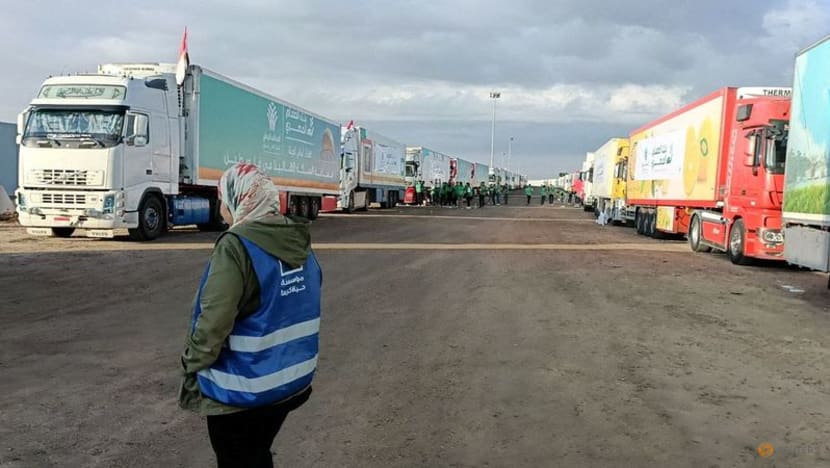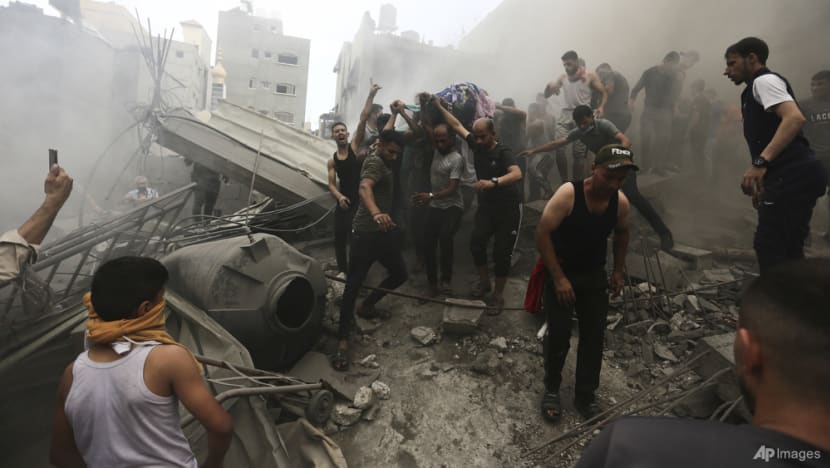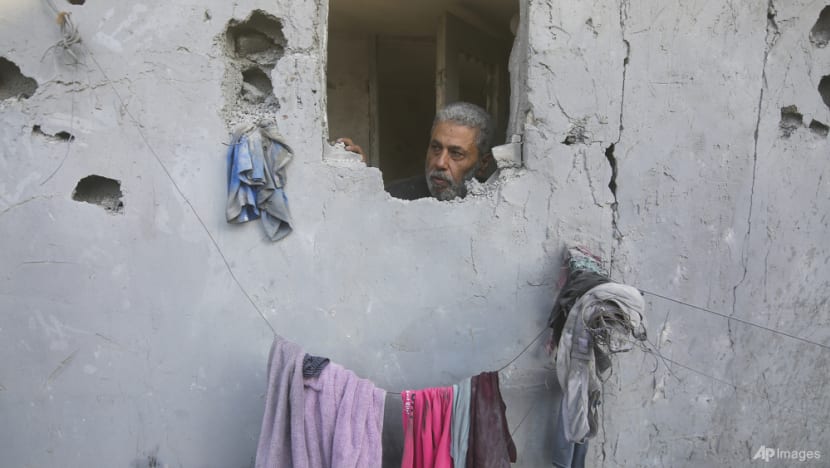‘No place is safe’: Aid agencies call for ceasefire in Israel-Hamas war, as supplies at Rafah border wait to enter Gaza
Gaza is awaiting much-needed humanitarian aid to reach the territory's 2.4 million people.

Trucks carrying humanitarian aid from Egyptian NGOs for Palestinians, wait for the reopening of the Rafah crossing at the Egyptian side, to enter Gaza in Rafah, Egypt, on Oct 17, 2023. (Photo: REUTERS/Stringer)

This audio is generated by an AI tool.
Humanitarian agencies are calling for an immediate ceasefire between Israel and Palestinian militant group Hamas, as truckloads of supplies at Egypt’s Rafah border crossing wait to enter war-torn Gaza.
The densely-populated enclave is awaiting much-needed humanitarian aid to reach its 2.4 million people.
“Time is running out, and it is running out fast. This is why it is critical that we get humanitarian access,” said Ms Juliette Touma, director of communications at the United Nations Relief and Works Agency for Palestine Refugees in the Near East (UNRWA).
“What we need right now is more regular and sustained humanitarian access, so that organisations like UNRWA can bring in supplies fast and give it to people in need.”
UN secretary general Antonio Guterres on Thursday (Oct 19) called for “rapid, unimpeded humanitarian access” to the Gaza Strip, as Israel kept up its retaliation for Hamas' deadly attack on Oct 7.
He added that there is a need for food, water, medicine, and fuel at scale.
SHELTERS IN GAZA NO LONGER SAFE
Ms Touma said: “Fuel is going to be absolutely fundamental for electricity, for water pumping. So fuel is really, really critical, and supplies like food and other basic commodities.”
About one million people have been displaced across the besieged Gaza Strip, with many of them seeking shelter in UN facilities, including UN schools.
“They need supplies. They are in places that are very overcrowded. No place is safe in Gaza,” Ms Touma told CNA’s World Tonight on Thursday.
“Even our own UN shelters have been hit. At least 32 UNRWA installations have been impacted by the war in one way or another.
“No place is safe in the Gaza Strip, and this is exactly why there needs to be a ceasefire right away so that civilians everywhere are protected.”

Israel has been pounding the Gaza Strip since the surprise incursion by Hamas militants on Oct 7, which Israeli officials say killed more than 1,400 people, mainly civilians.
Israeli retaliatory strikes have killed more than 3,700 people in Gaza, also mostly civilians, and left entire neighbourhoods in shambles.
“We are hopeful and we are calling for action for an immediate humanitarian ceasefire. That is going to open the door for us getting humanitarian access and resumption of supplies,” said Dr Deepmala Mahla, vice president of humanitarian affairs at humanitarian agency CARE.
“There has to be a ceasefire, civilians have to be protected, and then humanitarian aid can begin and scale up because the need is massive.”
RESPECTING INTERNATIONAL HUMANITARIAN LAWS
Human rights defenders have called for all parties in the ongoing conflict to respect humanitarian laws and avoid making civilians and aid workers targets.
“The promise of upholding international humanitarian laws has been broken far too many times,” Dr Mahla told CNA’s Asia Now.
She urged world leaders to uphold laws to safeguard civilians and also humanitarians, so they can “reach those people who need us desperately”.
Mr Benoit Carpentier, spokesperson for the International Federation of Red Cross and Red Crescent Societies (IFRC), said the international humanitarian laws “are the rules of war, and that's the basic rules that need to be respected in any conflict”.
“These have been created to protect the civilians, to protect the health workers on the ground, to make sure that they don't become a target. So that's the basic thing that needs to happen at the moment,” he said.

Mr Carpentier noted that there is a need to ensure a safe environment for humanitarian operations to proceed.
“That cannot happen if there are bombings. Our colleagues have been operating day and night from the escalation of the violence, risking their lives every day… just to help the people,” he said.
NEEDS IN GAZA ARE IMMENSE
Trucks full of humanitarian aid, including food and water, bound for Gaza are currently stuck waiting on the Egyptian side of the border.
The Rafah border crossing between Egypt and Gaza, which is the only route in or out of the enclave that is not controlled by Israel, was closed after the start of the conflict, following several bombings by Israeli aircraft.
The crossing will soon be opened following repairs, after United States President Joe Biden struck a deal with Egypt and Israel to allow aid in.
“The needs are immense. We need to make sure the aid is being given to all the people in Gaza. And if the Rafah border is the only access for now, we need to make sure that as much as possible goes through there,” said Mr Carpentier.
“Any initiatives that could help in getting aid inside Gaza, for people to be safe in places like hospitals, are all welcome. That's what we hope at the moment – for people to be safe and receive humanitarian aid as soon as possible.”
‘SITUATION IS UNFATHOMABLE’
UN humanitarian chief Martin Griffiths has estimated that about 100 trucks per day are needed to meet the needs in Gaza.
Currently, the delivery of humanitarian assistance “is very patchy, very broken and ad-hoc”, said Dr Mahla, adding that aid workers in Gaza too, are struggling to find shelter and stay safe.
“They are affected as well as they are the responders. Humanitarians are not a target. Civilians are not a target, nor are they bargaining chips.”
Yet, Dr Mahla noted that humanitarian agencies have vast experience in delivering aid on the ground, in areas which have active hostilities.
Related:
“The systems and structures are in place, humanitarians are ready and they are already coordinating among ourselves,” she said.
“There are risks, but there are systems in place to ensure that aid will reach those who are most needed. This is not the time for discussions. This is the time to take action.
“As humanitarians, we do not take sides. We are desperately waiting to have the environment which will allow us to take action.”
















